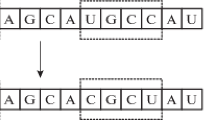Abstract
Artificial Fish Swarm is a kind of swarm intelligence algorithm, which focuses on the behavior of individual fishes and information interactions among them during foraging and preying on something in real environment. A novel Artificial Fish Swarm Optimization Algorithm Aided by Ocean Current Power (abbreviation for AFSAOCP) is proposed, which assumes the ocean current always causes certain influence on the fishes’ activity speed. Firstly, the computing model of ocean current is developed and constructed. Then the influence level of the ocean current on fishes is analyzed. If fishes are swimming along ocean current direction, ocean current will drive fishes’ speed increment, which is called positive influence; if fishes are swimming against ocean current, the current will hinder the fishes’ speed, which is called negative influence. In addition, fishes’ speed is not influenced by the ocean current, which is called merits offset faults. To sum this up, fishes in each group have different speed range, respectively. Grouping strategies can not only increase species diversity, but it can also make the algorithm escape from local optimal value in the iteration process. The proposed variant, AFSAOCP, is examined on several widely used benchmarked functions, and the experimental results show that the proposed AFSAOCP algorithm improves the existing performance of other algorithms when dealing with the different dimension and multimodal problems.















Similar content being viewed by others
References
Martens D, Baesens B, Fawcett. T (2011) Editorial survey: swarm intelligence for data mining. Machine learning, pp 1–42
Colomi A, Dorigo M, Maniezzo V (1991) Distributed optimization by ant colonies. In: Proceedings of the first European Conference on artificial life. Paris, France
Eberhrt R, Kennedy J (1995) A new optimizer using particle swarm theory. In: Proceeding of the 6th international symposium on micro machine and human science, pp 39–43
Li X, Shao Z, Qian J (2002) An optimizing method based on autonomous animates: fishswarm algorithm. Chinese Journal of systems engineering-theory & practice, pp 32–38
Li X (2003) A new intelligent optimization algorithm—artificial fish swarm algorithm. Zhejiang University
Wang H, Zhao X, Wang K, Xia K, Tu X (2013) Cooperative velocity updating model based particle swarm optimization. Applied intelligence, pp 322–342
Jiang M, Zhu K (2011) Multiobjective optimization by artificial fish swarm algorithm. In: Proceedings of the IEEE international conference on computer science and automation engineering(CSAE), pp 506–511
Liu J, Chen X, Liu Q, Sun J (2013) Prediction of satellite clock errors using ls-svm optimized by improved artificial fish swarm algorithm. Signal processing, communication and computing(ICSPCC), pp 1–5
Yazdani D, Toosi AN, Meybodi MR (2009) Fuzzy adaptive artificial fish swarm algorithm. International joint conference on computational sciences and optimization, pp 317–321
Yan W, Liguo Z (2011) Method of Bayesian network parameter learning bse on improve artificial fish swarm algorithm. Communications in computer and information science, pp 508–513
Zhou Y, Huang H, Zhang J (2011) Hybrid artificial fish swarm algorithm for solving 3-conditioned linear systems of equations. International conference on cloud computing and intelligence systems, pp 656–661
Liu S, Han Y, Ouyang Y, Li Q (2014) Multi-objective reactive power optimization by modified artificial fish swarm algorithm in ieee 57-bus power system. Power and energy engineering conference (APPEEC), pp 1–5
Liu Y (2009) Artificial fish swarm algorithm applicates in wireless aensor network (wsn) by optimization problems. Shandong University
Cheng YM, Jiang MY, Yuan DF (2009) Novel clusting algorithms based on improved artificial fish swarm algorithm. In: Proceedings of the 6th international conference on fuzzy systems and knowledge discovery, pp 141–145
Zhang C, Zhang F, Li F, Wu H (2014) Improved artificial fish swarm algorithm. Industrial electronics and applications(ICIEA), pp 748–753
Liang X (2013) Precise underwater localization based on ocean current information. Dissertation Submitted to Shanghai Jiao Tong University for the Degree of Master
Yang Z (2004) Marine geology. Shandong education publishing house
Huang X (2010) The knowledge of geography. The encyclopedia of China publishing house
Wu X (2009) The trace of water ShenYang publishing house, pp 92–95
Zhu Y-F, Tang X-M (2010) Overview of swarm intelligence. International conference on computer application and system modeling, pp 400–402
Yang X, He X (2015) Swarm intelligence and evolutionary computation: overview and analysis. Recent advances in swarm intelligence and evolutionary computation, pp 1–23
Neshat M, Sepidnam G, Sargolzaei M, Toosi AN (2014) Artificial fish swarm algorithm: a survey of the state-of-the-art, hybridization, combinational and indicative applications. Artificial intelligence review, pp 965–997
Wang H, Zhang K, Tu X (2015) A mnemonic shuffled frog leaping algorithm with cooperation and mutation. Applied intelligence
Acknowledgments
Financial supports from the National Natural Science Foundation of China (No. 61572074) and the 2012 Ladder Plan Project of Beijing Key Laboratory of Knowledge Engineering for Materials Science (No.Z121101002812005) are highly appreciated.
Author information
Authors and Affiliations
Corresponding author
Rights and permissions
About this article
Cite this article
Wang, Hb., Fan, CC. & Tu, Xy. AFSAOCP: A novel artificial fish swarm optimization algorithm aided by ocean current power. Appl Intell 45, 992–1007 (2016). https://doi.org/10.1007/s10489-016-0798-7
Published:
Issue Date:
DOI: https://doi.org/10.1007/s10489-016-0798-7




